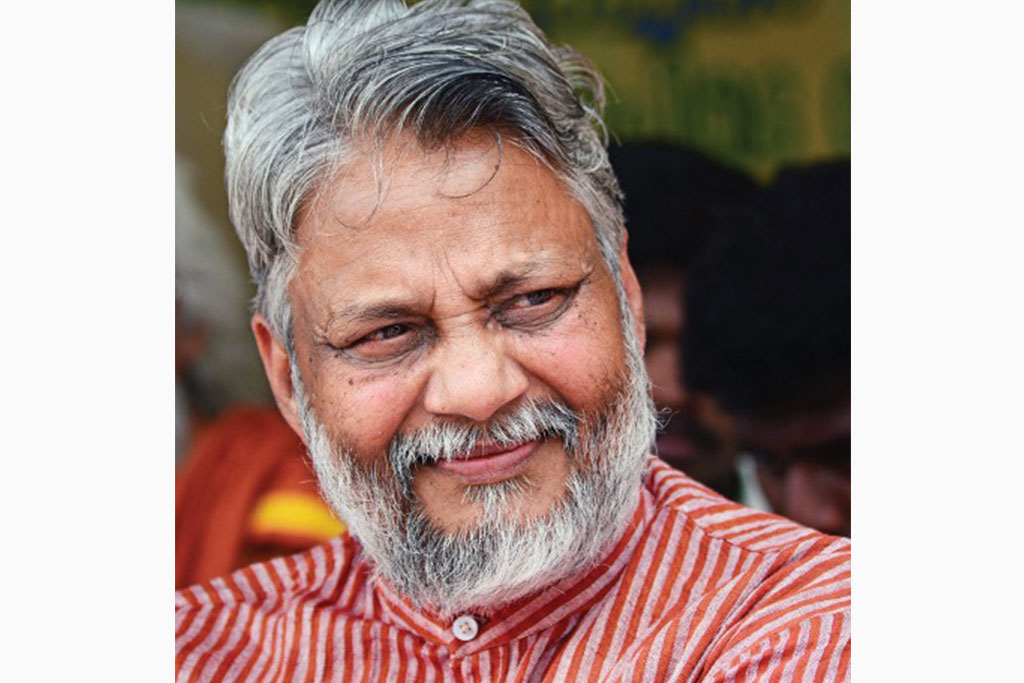
The Waterman of India
The importance of water in promoting and sustaining life cannot be overemphasised. In places where water is scarce, every drop wasted equates to making life a mite more challenging than it already is. An example is the Thar Desert of Rajasthan, whose extreme climate has been the reason for a steady exodus of native populations down the centuries. Yet, in this forbidding world, there are those organisations that have braved every challenge and hardship to bring hope and help the region attain self-sufficiency. One among them is the Tarun Bharat Sangh of Alwar.
Gandhian to the core
Tarun Bharat Sangh (TBS) was established in 1975 by a group of professors and students of the University of Rajasthan to aid the victims of a campus fire. A renowned NGO today, among its members is Dr Rajendra Singh, its incumbent chairman, who had joined the organisation way back in 1980. Then a ‘National Service Volunteer’ for education in Jaipur, within a few years of joining, Dr Rajendra Singh resolved to transform TBS into a more impactful organisation by shifting its focus to rural development, as against dabbling in relief work in the city. And with that began TBS’s transformative journey. Asked about the rationale behind this, Dr Singh, a Gandhian to the core, says, “If we work in rural areas, we can create opportunity for livelihood in the villages and help them become self-sufficient. That will stop the trickle of rural populations to urban areas and avoid unnecessary population pressures on cities.”
Thus, inspired by the Gandhian model of rural development, on October 2, 1985, Rajendra Singh, accompanied by a few like-minded friends, went to live in Kishori village, in the Alwar district of Rajasthan. Given his Bachelor of Ayurveda, Medicine and Surgery degree, Rajendra Singh started a medical practice in a nearby village called Gopalpur, while his friends started a school for children. But despite all their zeal and hard work, they were hardly able to arouse the interest or support of the villagers.
Quest for water
Disappointed and disillusioned, for Rajendra Singh and his team it was time to change tack, and the impetus for this came by way of a chiding village elder, Mangu Patel, who had seen the village in its better days. One day, Rajendra Singh recalls, while returning from Gopalpur, Mangu Patel offered him a lift in his cart. During the course of conversation, on learning that Rajendra Singh and his friends were engaged in social work in the village, a reproachful Mangu Patel said, “Why are you wasting your time here going about educating children and treating people? We don’t need your education, or your medicine; what we really need is water.”
Down the decades, with villagers relying more and more on tube wells and forsaking traditional methods of water conservation, the Thar region’s aquifers had been depleted, sending groundwater levels plummeting to record lows. Rampant mining for marble, granite and dolomite had further aggravated the situation. All this had led to acute water shortages, severely affecting both agriculture and the ecosystem. The state of affairs seemed hopeless, explaining Mangu Patel’s reproach.

Dr Rajendra Singh talking at an event in New Delhi on World Water Day
Water, water everywhere
For Rajendra Singh and his friends, this meant that if they really wanted to help, they would have to work towards restoration of the region’s traditional water resources by desilting the now defunct johads (small percolation ponds and check dams that capture and conserve rainwater, improving percolation and groundwater recharge). Though they had not really anticipated this, they got to work. Gradually the village folk started to join hands them, and after weeks of toil, the first of the johads had been cleaned. As the monsoons arrived and filled the johad, joy and euphoria erupted across the village.
The success produced a ripple effect, as villagers, under TBS’s supervision and support, took to restoring other long-neglected johads and irrigation dams, until they had restored enough of them to create thousands of acres of water bodies within Gopalpur itself. As rainwater filled these johads, it made irrigation possible, replenished the aquifers and raised groundwater levels, helping villagers to raise crops to sustain themselves and also have enough fodder for their animals. Dr Singh and his team had tasted their first major success.
The Gopalpur success spilled on to neighbouring villages, as more and more villages joined hands with TBS to restore the johads and check dams in their areas. To ensure that the desilted johads did not fill up again due to soil erosion, the necessity was felt to stop soil erosion through afforestation, especially in the nearby Sariska Tiger Reserve, where mining activities, deforestation and illegal poaching of animals had taken a heavy toll on its green cover. Redressing these issues was not easy, as various mafias were involved; but Rajendra Singh was willing to take the fight to them. “I started with the mining mafia and won our case against them in the Supreme Court in the very first attempt, which stopped 478 mines in the region,” says Dr Singh. A notification to ban mining in the entire Aravalli region was also acquired subsequently.

A johad supporting crop cultivation and greenery all around it
A balanced ecosystem
Encouraged by the victory, to create widespread awareness, Dr Singh started his National Water March (Rashtriya Jal Yatra), covering 144 river basins across the country. Soon after, people joined Dr Singh in a big way, including the tribals in the Sariska region. To inculcate love and respect for the forest and nature among the populace, both Dr Singh and local gram sabhas swung into action. The fallout of this concerted effort to conserve forests, water, wildlife and nature was that a local river, Arvari, which had dried out years ago, started flowing again Rajendra Singh explains: “As the forest was in the catchment area of the river, with the forest recharging the aquifers, groundwater levels came up and the river came to life once again.” And with that, his quest for river rejuvenation began.
By and by, other rivers in the region—Ruparel, Sarsa, Bhagani and Jahajwali—started flowing as well, earning commendation for Rajendra Singh from the world over. In 2015, he was honoured with the prestigious Stockholm Water Prize, otherwise known as “the Nobel Prize for Water”. This, however, was just another feather in the cap of the dedicated, fearless crusader, who had been earlier honoured with other prestigious awards such as the Rotary International Award for water conservation in 1992, the Ramon Magsaysay Award in 2001 for community leadership and pioneering work in water harvesting and management, the Jamnalal Bajaj Puraskar for application of science and technology in rural development, the Ahimsa Award by UK-based Institute of Jainology, the Prithvi Bhushan award, and scores of others. An inspirational icon today who has been instrumental in transforming 1,200 villages in Rajasthan by restoring or creating 11,800 water bodies, it is no surprise then that Dr Singh’s achievements have earned him the sobriquet of ‘Jalpurush’ or ‘Waterman of India’.
Indomitable spirit
Success, however, often comes at a price and Dr Singh had to pay one too—by way of attacks on his life on three occasions. On one occasion the attack was so severe that he lay in a coma for months! Rather than cower and back down, Dr Singh says the incident only served to make him more disciplined and absolutely fearless.
As of today, TBS has grown to encompass thousands of supporters, workers and volunteers, who work under the guidance of Dr Singh and a general body of leaders, in keeping with the organisation’s broad objective of establishing Gram Swarajya, or village self-rule. No assistance is taken from outside agencies for this. “I never take any grant from any government or corporate body. All our work is done by my community,” says Dr Singh. To facilitate and manage various initiatives, community-based organisations such as gram sabhas, forest conservation committees, water conservation committees, women’s self-help groups, river-based organisations and others have also been nurtured.

Dr Rajendra Singh inspecting a johad with villagers
Miles to go
Asked how he feels having achieved so much in life, Dr Singh says, “I feel I am the happiest person on earth. Compared to what I have taken from nature, I have given it back a thousand-fold, and this has contributed towards betterment of both nature and humanity.” Now 61, but far from giving it all up for a quiet, retired life, he looks to finding peaceful and sustainable solutions to curb the imminent war for water that is threatening to engulf the world, especially in Europe, where the number of “climate refugees” is ever on the rise. Unassuming and down-to-earth, but very determined, Dr Singh says his language may only be like water, but his voice is like an indomitable river. It is.










